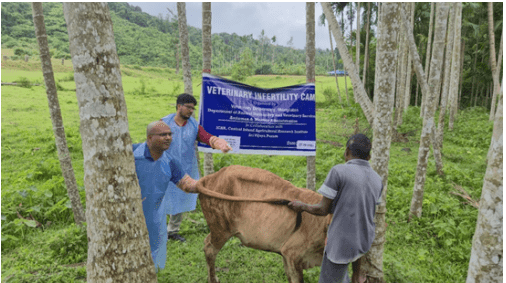A veterinary health and infertility awareness camp held recently in the villages of Guptapara and Humfreygunj aimed to address one of the most pressing challenges faced by livestock owners: infertility among cattle. Organised by the Veterinary Dispensary, Manglutan under the Department of Animal Husbandry and Veterinary Services, in partnership with ICAR – Central Island Agricultural Research Institute (CIAR), Sri Vijaya Puram, the camp focused on identifying and treating reproductive disorders in cows.
Conducted on June 27, 2025, the camp targeted livestock farmers from the rural belt who often suffer economic setbacks due to declining fertility in their animals. According to officials, infertility in dairy animals not only reduces milk yield but also results in increased maintenance costs and loss of income, especially for small and marginal farmers.
During the camp, veterinary experts and research scientists examined seven cows presented with infertility-related issues. Detailed clinical evaluations were conducted to identify the underlying causes of reproductive failure. Following the diagnosis, veterinarians administered necessary treatments and offered follow-up advice to farmers regarding animal care, nutritional supplementation, and breeding management practices.
Senior professionals involved in the camp included Dr. Perumal P, Senior Scientist at ICAR-CIARI, and Dr. Lawhale Ninad Sahebrao, Senior Veterinary Officer, along with support staff from the Veterinary Dispensary. The presence of such experienced personnel ensured that the diagnoses and treatments offered were based on the latest veterinary protocols and research findings.
The objective of the camp extended beyond clinical treatment. It was designed as a knowledge-sharing platform, where farmers were educated on early signs of reproductive disorders, importance of timely intervention, and best practices for animal husbandry. Discussions also included the role of balanced nutrition, vaccination, and regular health check-ups in maintaining reproductive efficiency.
Officials noted that in regions like the Andaman Islands, where dairy farming plays a key role in rural livelihood, livestock health has a direct bearing on household income and food security. Infertility, if left unaddressed, can severely impact the sustainability of dairy operations.
As part of a larger veterinary outreach effort, such camps are expected to be held regularly in different panchayats. By taking healthcare services directly to remote areas, the department hopes to bridge the gap between scientific knowledge and grassroots livestock management.
Farmers who participated in the camp expressed appreciation for the services offered and the attention given to individual cases. For many, this was the first opportunity to receive structured veterinary guidance tailored to their specific challenges.
The Department of Animal Husbandry has reaffirmed its commitment to supporting rural farmers through mobile units, on-ground interventions, and continued partnerships with research institutes. Officials have also called for greater awareness among farmers to take proactive steps in reporting animal health issues early.
With rising demand for dairy products and increased pressure on livestock to perform economically, the importance of scientific animal management is greater than ever. The success of this camp serves as a reminder that timely intervention, education, and expert guidance can help mitigate long standing problems like infertility and ensure a more sustainable future for rural farmers in the islands.
As the camp concluded, plans were already in place for future outreach activities, cementing the initiative as a cornerstone in the region’s rural veterinary strategy.





